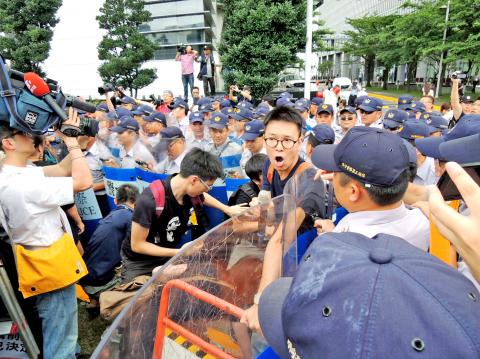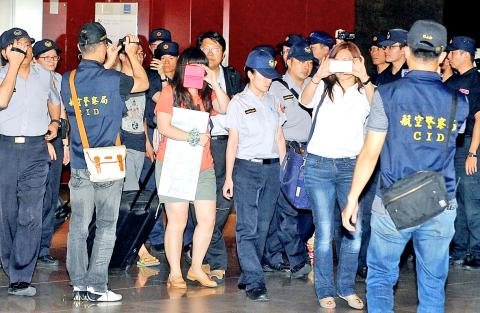Activists yesterday accused the government of abuse of power after a group of “unidentified people” charged into their rooms at the Novotel Hotel in Taiwan Taoyuan International Airport and demanded that they move out before China’s Taiwan Affairs Office Minister Zhang Zhijun (張志軍) was to meet his Taiwanese counterpart, Mainland Affairs Council Minister Wang Yu-chi (王郁琦), at the hotel.
Rights activist and attorney Lai Chung-chiang (賴中強) condemned the government and Novotel over the hotel’s treatment of him as a guest.
“Because of the meeting between Wang and Zhang, we were deprived of our freedom for more than 10 hours,” Lai told the crowd after he was released by the police a little after 7pm. “How many more of our human rights and freedoms should be sacrificed for Zhang? Or to make Beijing happy?”

Photo: Chou Min-hung, Taipei Times
“I have booked the rooms through the regular reservation system and paid for the rooms, so, legally, they are the same as a private home during the period. The police and the hotel staff had no right to do what they did,” he said.
Lai said he booked two rooms for two nights and checked into the hotel on Tuesday night.
However, police and hotel staff knocked on his door at about 9am yesterday, asking them to vacate the rooms, saying there might be “security concerns.”

Photo: Chu Pei-hsiung, Taipei Times
They returned later and forcibly broke into the rooms, saying that since there is only person registered for each room, all other people must leave.
“That doesn’t make sense at all. Isn’t it common practice around the world that only one person needs to register his or her name for a room?” Lai said. “Therefore we refused to leave.”
Another person in the room, Chien Nien-yu (簡年祐), said that the police and hotel staff pretended it was room service the first time they knocked on the door.
Lai said he and six other members of Democracy Tautin were planning to hang protest banners from the windows of their hotel rooms when Zhang arrived, “but we didn’t mean to interrupt the meeting, and it’s our freedom or expression to do what we planned to do as long as we don’t bother people.”
Since the hotel staff and the police failed to have them vacate the rooms before Zhang’s arrival, more than a dozen police officers stood guard outside the rooms, prohibiting them from leaving when the meeting started.
By telephone, the Taipei Times overheard the conversation between Lai and the hotel staff.
When Lai asked if they could leave at 6:15pm, the staff member said: “You have to wait until a little later to leave.”
When Lai turned to a police officer, saying he would like to file a lawsuit of breach of freedom of movement, the officer said Lai must follow him to another place to make the report.
The seven in the room were forced into police cars at 6:57pm. They were released and greeted by a crowd of protesters outside at 7:05pm.
Hours after the incident and with the picture of a broken door latch and the video of hotel staff breaking into the hotel rooms going viral on the Internet, 13 civic groups jointly organized a press conference condemning the state intrusion.
A hotel room booked by a customer is tantamount to the personal residence, said Greg Yo (尤伯祥), a lawyer and member of the Judicial Reform Foundation.
“My house is my castle. This is a principle of freedom and safety of residence that has been finally established after years of authoritarian rule in Taiwan. However, this line has been crossed by the government’s action this morning. What the government is telling the public by its action is that it has no concern whatsoever for such a red line... Then [its] next step would be taking people away on the street without justification,” Yo said.
Foundation executive director Kao Jung-chih (高榮志) attributed the police’s abuse of power to the prosecutors’ connivance, the court’s negligence and the failure of judicial authorities to take on the responsibility of checks and balances.
In response to the complaints, the police said it was hotel staff who broke into the rooms of the guests and that the police happened to be at the site and filmed the whole process.
The National Security Bureau also denied in a press release that its agents were involved in the “break-in” incident, saying the bureau was only in charge of the security of designated individuals.
Additional reporting by Alison Hsiao, Chris Wang and CNA

NATIONAL SECURITY THREAT: An official said that Guan Guan’s comments had gone beyond the threshold of free speech, as she advocated for the destruction of the ROC China-born media influencer Guan Guan’s (關關) residency permit has been revoked for repeatedly posting pro-China content that threatens national security, the National Immigration Agency said yesterday. Guan Guan has said many controversial things in her videos posted to Douyin (抖音), including “the red flag will soon be painted all over Taiwan” and “Taiwan is an inseparable part of China,” while expressing hope for expedited “reunification.” The agency received multiple reports alleging that Guan Guan had advocated for armed reunification last year. After investigating, the agency last month issued a notice requiring her to appear and account for her actions. Guan Guan appeared as required,

Japan and the Philippines yesterday signed a defense pact that would allow the tax-free provision of ammunition, fuel, food and other necessities when their forces stage joint training to boost deterrence against China’s growing aggression in the region and to bolster their preparation for natural disasters. Japan has faced increasing political, trade and security tensions with China, which was angered by Japanese Prime Minister Sanae Takaichi’s remark that a Chinese attack on Taiwan would be a survival-threatening situation for Japan, triggering a military response. Japan and the Philippines have also had separate territorial conflicts with Beijing in the East and South China

A strong cold air mass is expected to arrive tonight, bringing a change in weather and a drop in temperature, the Central Weather Administration (CWA) said. The coldest time would be early on Thursday morning, with temperatures in some areas dipping as low as 8°C, it said. Daytime highs yesterday were 22°C to 24°C in northern and eastern Taiwan, and about 25°C to 28°C in the central and southern regions, it said. However, nighttime lows would dip to about 15°C to 16°C in central and northern Taiwan as well as the northeast, and 17°C to 19°C elsewhere, it said. Tropical Storm Nokaen, currently

PAPERS, PLEASE: The gang exploited the high value of the passports, selling them at inflated prices to Chinese buyers, who would treat them as ‘invisibility cloaks’ The Yilan District Court has handed four members of a syndicate prison terms ranging from one year and two months to two years and two months for their involvement in a scheme to purchase Taiwanese passports and resell them abroad at a massive markup. A Chinese human smuggling syndicate purchased Taiwanese passports through local criminal networks, exploiting the passports’ visa-free travel privileges to turn a profit of more than 20 times the original price, the court said. Such criminal organizations enable people to impersonate Taiwanese when entering and exiting Taiwan and other countries, undermining social order and the credibility of the nation’s